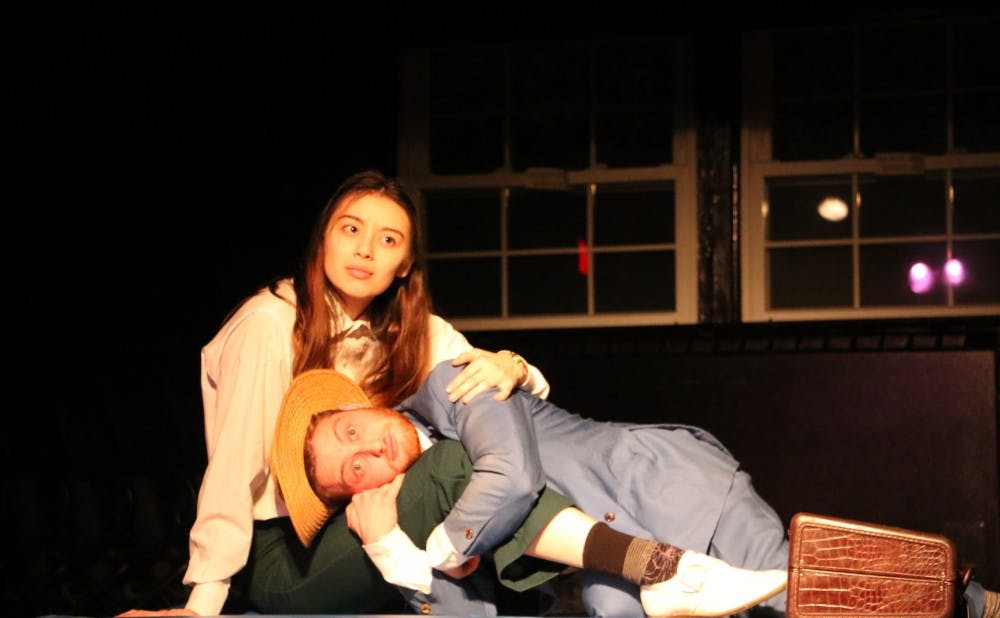“Good Country People” is the furthest thing from a pleasant read. Flannery O’Connor’s 1955 short story has few truly likable characters and ends on a sour, dismal note that leaves the reader discontented. The tale of Joy Hopewell — who takes issue with her sunny name and changes it to “Hulga” in an act of defiance against her mother — and her life on a Georgia farm is relatively straightforward and not particularly emotionally dense or politically charged. This raises the question of why the Duke Players chose to adapt this particular story for their spring lab production.
“I've grown to love this play because it really feels like art for art's sake,” sophomore Liddy Grantland said, who pulled double duty as the show’s dramaturg and as the role of Mrs. Freeman, one of the tenants. “The last play I was in had a really clear social message — it was actually really didactic in what you were supposed to take away from it. But this play — and Flannery O’Connor stories generally — is a lot less like that. You can take away from the play the importance of empathy and honesty, but you'll also probably leave the theater thinking about just how weird and wild human beings are.”
Indeed, the Theater Studies department’s last theatrical effort was an adaptation of Caryl Churchill’s “Vinegar Tom,” a damning exploration of sexual assault and female hysteria that was punchy and relevant in its subject matter and presentation. It had a message so obvious it bordered on ham-fisted, but its mounting fit well into the current sociopolitical climate and made creative sense. Finding the purpose in “Good Country People” is a little more challenging: It is definitely an interesting take on the source material and the cast, while not perfectly polished, clearly had fun tackling their roles. As Grantland said, there is not the same level of meaningfulness present in “Good Country People” as in other Theater Studies productions, which is far from a problem. With so much pressure for art to convey deliberate and deep messages, it is often a relief to settle in and watch a show that is not striving to educate or illuminate.
Senior Ashley Ericson and sophomore Valerie Muensterman have respectively directed and written an unusual show that confuses as much as it entertains. While this is often the fault of the source material, which does not lend itself to moral clarity or narrative engagement, the play can occasionally come across as jumbled. There is simply too much effort made to liven up the dullness or make a narrative beat land harder than it needs to for the sake of the story. It appears as though there was a bit of a rush to get this production together: The sparse set is sometimes a little too bare-boned and the actors, though game, are not equally matched in terms of professionalism and ability to use their space. The show is definitely entertaining in the moment, but like O’Connor’s short story, the impression that it leaves is not always positive.
However, the effort that was put into this production does not go unnoticed. Grantland’s work as dramaturg is evident in every line read: She has obviously done her research well.
“Over winter break I compiled a glossary for the cast that took specific lines in the script and explained their significance, which was especially necessary for Bible references because they're all over the place in this play!” Grantland explained, her enthusiasm for the project practically infectious.
The understanding of the source material is well-demonstrated in every scene, even if the presentation of it is a little schizophrenic. While the play is far from perfect, it is definitely an experience far more enjoyable than what one might expect from a short story about deception and stealing prosthetic limbs. As Grantland so eloquently puts it, “it is art for art’s sake” — and sometimes that’s all one can really ask for from theater.
Correction: A previous version of this article stated that “Vinegar Tom” was a Duke Players production. The article has been updated to reflect that it was a Theater Studies production. The Chronicle regrets the error.
Get The Chronicle straight to your inbox
Signup for our weekly newsletter. Cancel at any time.

